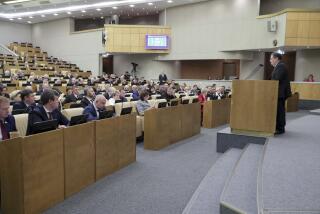Yeltsin Signs Order for $6.5-Billion Cut in Federal Budget
- Share via
MOSCOW — Attempting to shore up Russia’s sagging economy, President Boris N. Yeltsin signed a decree Tuesday slashing the government’s budget this year by the equivalent of $6.5 billion.
The move, however, did not restore investor confidence; Russian blue-chip shares continued their slide, dropping another 5%--bringing the stock market to its lowest level in two years.
“The market of the Russian trading system has not been developing in the best way in recent days,” Finance Minister Mikhail M. Zadornov said. “This is a question of investor confidence in the policy of the government and the Central Bank.”
As foreign investors continued to pull out of the Russian stock market to find better deals in other lands, the ruble fell further against the dollar, reaching the limit set by the Central Bank. In recent months, the government has spent an estimated $5 billion to buttress the value of the ruble.
Prime Minister Sergei V. Kiriyenko insisted that the Russian currency will not be devalued, arguing that such an action would not stabilize it and that “the same situation would recur in two to three months.”
Russia’s stagnant economy had been poised for a recovery this year until it was hit by fallout from the Asian economic crisis and the plunging price of oil on world markets. The country’s growing fiscal crisis prompted reports this week that Russia would ask for aid from the International Monetary Fund similar to the rescue packages extended to Asian countries last year.
But Zadornov said Russia is not seeking such assistance. “The Finance Ministry has not approached anybody for additional money, not the IMF nor the World Bank,” he told reporters. At the same time, he conceded, “The situation can’t fluctuate like that for long.”
In another bad sign, yields on one-year Russian treasury bills soared to 62%, up from 50% at the close of trading Monday. Rising interest rates mean that the government’s cost of borrowing money is also rising, further hampering its ability to pay wages and meet its other obligations.
Zadornov announced that Russia’s exports had dropped 15% in the first quarter of the year, primarily because of the drop in fuel prices.
The government also was forced Tuesday to scrap its auction of the Rosneft oil company because no one entered a bid. The government had hoped to raise at least $2.1 billion from the sale to replenish its depleted treasury. Kiriyenko said that a new auction will be scheduled and that the price will be revised.
The government, chronically short of money, fell even further behind this month when striking miners blocked sections of the Trans-Siberian Railway to protest the government’s failure to pay their wages.
Railroad Minister Nikolai Aksyonenko said Tuesday that the protests cost the ministry $68 million in lost revenue. Businesses that depend on the transport system lost hundreds of millions of dollars more, officials said.
To help end the protests, the railroad agency contributed more than $11 million to pay a portion of the miners’ back wages--using money earmarked to pay the wages of the railway’s own workers.
“This was done not because we have money to spare but because we are aware of the possible consequences of the railroad blockade for the Russian economy,” Aksyonenko said.
Complicating matters even more for Yeltsin’s newly appointed prime minister and Cabinet is a decline in Russia’s tax collection. Chief tax collector Alexander Pochinok said the government expects to raise $1.94 billion this month, compared with $2.05 billion in April.
The budget cuts ordered by Yeltsin will reduce spending by every government agency, officials said. The cost-cutting program, with its 50 parts, is scheduled to take effect over the next two months.
The Kremlin said the decree also will raise as much as $2.2 billion in new revenue by instituting such steps as improving tax collection and increasing revenue from alcohol sales. But similar measures have been announced in the past with little apparent result.
Outside Moscow, regional and local governments owe their workers the equivalent of $1.3 billion in back wages, Deputy Prime Minister Oleg N. Sysuyev said.
He called on governors and local officials to sign an agreement proposed by Yeltsin that would transfer federal money to the regions but give the central government greater control over how it is spent. “We should unite to solve problems the country is facing,” he said on Echo of Moscow radio. “If we do that, the autumn won’t be ‘hot’ for us.”
More to Read
Sign up for Essential California
The most important California stories and recommendations in your inbox every morning.
You may occasionally receive promotional content from the Los Angeles Times.













